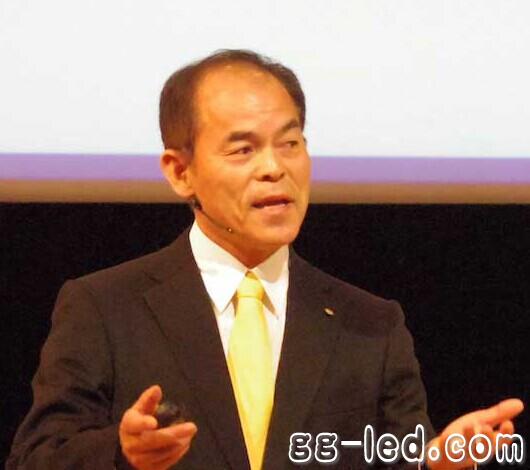On December 8, 2014, the Nobel Prize commemorative speech was held at Stockholm University, Sweden. Among the three people who won the physics award, Nakamura Shuji was last staged. In his speech, he reviewed the research process of blue LEDs and emphasized the importance of InGaN, which is indispensable for high brightness. In addition, he also introduced the current research focused on the use of laser lighting.
In the speech, Nakamura said that he "is a newcomer in the field of GaN-based blue LEDs", but his achievements have caught up with and surpassed the data that Chiaki and Amano's research team took the lead. Its driving force is "dual flow MOCVD".
NAKAMURA InGaN indispensable <br> <br> MOCVD apparatus utilizing dual implemented based double heterojunction structure including InGaN, to achieve a high luminance blue LED, thereby promoting the practical process.
It has been widely believed in the industry that bright crystal light will not be emitted without reducing the crystal defects called "dislocations" in the GaN crystal to 103/cm2, but even if this defect is as high as 109/cm2 after using InGaN. It can also achieve high brightness illumination. It is this characteristic of InGaN that drives the realization of blue LEDs and the subsequent blue-violet semiconductor lasers.
So why does InGaN still illuminate in the presence of many crystal defects? In introducing its principles, Nakamura quoted the research results of Professor Chikubu Hiroshi of Tohoku University in Japan as saying that "is related to the localization effect of In".
The laser will replace the LED
After reviewing the research of blue LEDs, Nakamura introduced the illumination of semiconductor lasers that are currently being studied. The blue LED has the problem of "decreased light efficiency", and the higher the brightness, the more difficult it is to improve efficiency. The laser does not have this problem, "laser illumination can achieve very high efficiency compared to LED illumination." Therefore, Nakamura expects that laser lighting will replace LED lighting in the future.
Finally, Nakamura made a special thank-you for his time, thanked the founder of Nichia Chemical Industry, and agreed to develop blue LED and support it. In addition, Nakamura expressed gratitude to all the employees of the Nichia Chemical Industry, including the current president of Ogawa Shinhon’s footsteps, Ogawa Eiji, and the then subordinates. In addition, Nakamura expressed his gratitude to colleagues at the University of California, Santa Barbara (UCSB).

In the speech, Nakamura said that he "is a newcomer in the field of GaN-based blue LEDs", but his achievements have caught up with and surpassed the data that Chiaki and Amano's research team took the lead. Its driving force is "dual flow MOCVD".
NAKAMURA InGaN indispensable <br> <br> MOCVD apparatus utilizing dual implemented based double heterojunction structure including InGaN, to achieve a high luminance blue LED, thereby promoting the practical process.
It has been widely believed in the industry that bright crystal light will not be emitted without reducing the crystal defects called "dislocations" in the GaN crystal to 103/cm2, but even if this defect is as high as 109/cm2 after using InGaN. It can also achieve high brightness illumination. It is this characteristic of InGaN that drives the realization of blue LEDs and the subsequent blue-violet semiconductor lasers.
So why does InGaN still illuminate in the presence of many crystal defects? In introducing its principles, Nakamura quoted the research results of Professor Chikubu Hiroshi of Tohoku University in Japan as saying that "is related to the localization effect of In".
The laser will replace the LED
After reviewing the research of blue LEDs, Nakamura introduced the illumination of semiconductor lasers that are currently being studied. The blue LED has the problem of "decreased light efficiency", and the higher the brightness, the more difficult it is to improve efficiency. The laser does not have this problem, "laser illumination can achieve very high efficiency compared to LED illumination." Therefore, Nakamura expects that laser lighting will replace LED lighting in the future.
Finally, Nakamura made a special thank-you for his time, thanked the founder of Nichia Chemical Industry, and agreed to develop blue LED and support it. In addition, Nakamura expressed gratitude to all the employees of the Nichia Chemical Industry, including the current president of Ogawa Shinhon’s footsteps, Ogawa Eiji, and the then subordinates. In addition, Nakamura expressed his gratitude to colleagues at the University of California, Santa Barbara (UCSB).

Low-Speed Vehicle,Low Speed Vehicles,Low Speed Electric Vehicles,Low Speed Neighborhood Electric Vehicles
Jinan Huajiang environmental protection and energy saving Technology Co., Ltd , https://www.hjnewenergy.com